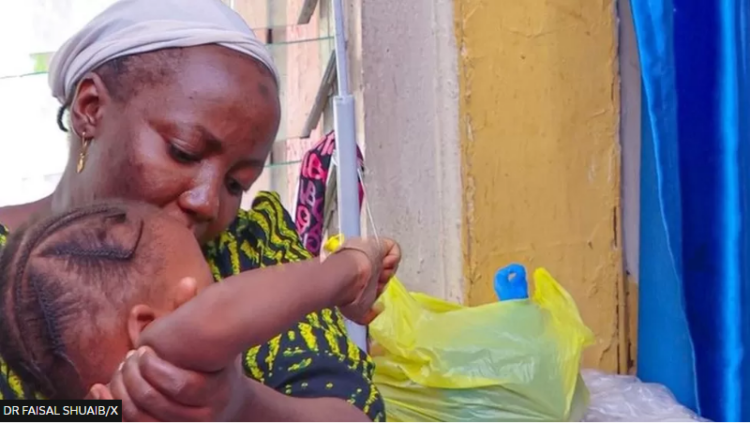More than 600 people, mostly children, have died of diphtheria in Nigeria since the current outbreak began in December 2022, officials say.
With 14,000 suspected cases, this outbreak is far worse than the last one in 2011 when 98 cases were reported.
Kano state, in northern Nigeria, is the epicentre, recording more than 500 deaths, but there has been a recent decline in active cases.
Diphtheria is highly contagious and affects the nose and throat.
It can also cause ulcers on the skin.
It is spread by coughs and sneezes or through close contact with someone who is infected, and in serious cases can be fatal.
It is preventable through vaccines, but many of the children who have died in Nigeria were unvaccinated, said Dr Faisal Shuaib, the head of the National Primary Health Care Development Agency.
During a visit to a diphtheria isolation centre in Kano city on Wednesday, he added: "Witnessing the young children suffering from this entirely preventable disease at the centre today was profoundly heart-wrenching."
The death toll has risen since 24 September, when the Nigeria Centre for Disease Control and Prevention (NCDC) reported 453 fatalities, and 11,587 suspected cases.
The World Health Organization (WHO) said the fatality and infection rate may be higher due to low testing and the failure by some patients to report their symptoms.
But Dr Shuaib said that measures, including contact tracing, have contributed to a decline in the number of cases.
The outbreak has hit 19 of Nigeria's 36 states as well as the federal capital, Abuja.
The worst-affected states are all in the north - Kano, Yobe, Katsina, Borno, Jigawa and Kaduna.
Health authorities are rallying parents with unvaccinated or partly vaccinated children to get them immunised, insisting that it is the most powerful way of controlling the outbreak.
The WHO said that only 57% of Nigerians are immunised with the pentavalent vaccine, which protects against five life-threatening diseases, including diphtheria.
Nigeria must increase vaccinations to cover at least 80% of the population to prevent future diphtheria outbreaks, it added.
The last major outbreak in the country was in 2011, when 21 people died and 98 were infected in Borno state, the WHO said.
Latest Stories
-
Ex-Deputy AG questions validity of Council of State’s prima facie case against Chief Justice
7 minutes -
Military training for National Service Personnel set to begin in August 2025
8 minutes -
All permanent PMMC staff are still at post; only contract staff laid-off – Sammy Gyamfi
12 minutes -
‘L.I 2462 will be revoked immediately Parliament reconvenes’ – Sammy Gyamfi
13 minutes -
Damang Mine gets 12-month lifeline from government
13 minutes -
‘He should’ve walked away’ – CDD Fellow criticises sacked TTH boss for staying despite system failure
1 hour -
Vitriol, aggression won’t halt presidential bid, Ivory Coast’s Thiam says
2 hours -
Global roundtable sees rising debt risks for low-income countries as uncertainty mounts
2 hours -
Government and Gold Fields strike historic deal on Damang Mine transition
2 hours -
South Africa withdraws planned VAT hike after political pushback
3 hours -
CDM condemns Mahama’s ‘political tribunal’ against Chief Justice, warns of dangerous precedent
3 hours -
Defending constitutionalism: Condemnation of the strange suspension of Chief Justice
3 hours -
CJ suspension: CDM warns of executive overreach and collapse of checks and balances
4 hours -
‘Ghana faces global rebuke over politicised judicial crackdown’, says CDM
4 hours -
TDC cracks down on Sakumono Ramsar Site encroachment amid rising tensions
5 hours

